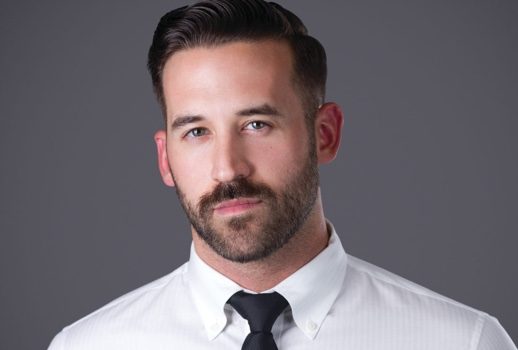
Jarrett Ott
Whether full-bodied and rich or comic and actorly, the baritone voice contains multitudes, and ranks among the more versatile fachs.
It’s also, as a trio of photogenic baritones reminded us Tuesday night with a recital at Weill Hall, a voice type that often comes wrapped in pretty packaging. Baritones are hot; they’re fodder for shirtlessness; fans document them on blogs, track them on Instagram, turn them into calendars. Their admirers are legion. Joyce DiDonato wishes she were one.
To be sure, ace baritones Tobias Greenhalgh, Steven LaBrie and Jarrett Ott deliver the visual goods in broad-shouldered spades; some of us have been drooling over them for years. But this is, of course, a true shame, as their musical gifts are ample and not to be discounted, and the singers sound every bit as good as they look.
Featuring entries from Remember, a collaborative new release from boutique label Roven Records, their Tuesday revue gave splendid voice to contemporary American composers like Benjamin C.S. Boyle, Jennifer Higdon, Glen Roven (himself a producer on the album) and Lori Laitman, while introducing a number of pieces crafted especially for the respective singers. The result was a smartly programmed evening of mostly new works, deftly accompanied by a troika of top-shelf pianists.
It’s in many ways unfortunate that the bill opened as it did, however, with a series of lesser performances. Three struggling baritones (Branch Fields, Kyle Pfortmiller, and Robert Wesley Mason) did their best to enliven Glen Roven’s tedious medley of classic mittlere Stimme arias (“Madamina,” “Di Provenza il Mar,” “Some Enchanted Evening,” you get the idea.)
Soprano Amy Shoremount-Obra, normally such a formidable presence onstage, fumbled her way through both the sparkling John Duke cycle Four Poems by Emily Dickinson and—alongside Fields, whose own instrument has definitely seen better days—a lackluster duet called “The Promise” by Roven and hack poet Jane Hirshfield.
Suffice it to say that by the time Greenhalgh and virtuoso pianist Adam Nielsen took the stage, we were ready for them. Greenhalgh opened with a forceful reading of John Adams’ take on the classic Donne sonnet “Batter My Heart” from Dr. Atomic, which showcased the dark, growling grain of his voice as well as his ability to balance the erotic masochism of Donne’s plaintive lines (“break, blow, burn, and make me new”) with Adams’ stark musical innovations.

Tobias Greenhalgh
For sheer aesthetics, Greenhalgh’s instrument isn’t ordinarily “beautiful”—its potency has more to do with the raw emotional range and expressiveness it possesses. The baritone layered these qualities to vivid effect on Roven’s ensuing setting of four poems by surrealist poet Paul Éluard, and delivered a performance of rare fluency.
The Éluard cycle presents a strange, sometimes inscrutable landscape of striking images—“The bull is under the sword of the wind,” for instance—alongside a truly scherzo-like jumble of musical ideas, so it takes gifted communicators like Greenhalgh and pianist Michael Brofman to make sense of its meaning.
At Carnegie Hall, Éluard was made at times not only clear, but astonishingly clairvoyant, by the two musicians: wherever his intonation grew muddy or his diction lost in declamato, Greenhalgh unfailingly wrought emotional significance from the verse, and showed how a knotty romantic encounter might otherwise be told plainly, unpretentiously, through a series of remote abstractions.
With Nielsen at the piano, LaBrie introduced two Lori Laitman/Joan Joffe Hall songs and Le passage des rêves, a cycle of four Paul Valéry poems set by composer Benjamin C.S. Boyle. The latter opus pairs the idioms of French Symbolism with a textured Neo-Impressionistic musical vocabulary to evoke a series of nocturnal meditations—the specter of Debussy loomed large—as the singer escorts us through a series of fleeting miniatures.
LaBrie, easily objectifiable as he bursts pectorally out of his white button-down, sings with the kind of physicality and pressure that seems to run on eight pistons: his voice doesn’t float so much as erupt. Either in the Boyle series or Laitman’s The Joy of Uncreating, LaBrie brought both electricity and brightly colored concern to the material Tuesday night.
I especially liked his distraught take on the final Valéry poem, “À l’aurore,” in whose climax the narrator frets stridently about not knowing if he can greet the new day.

Steven LaBrie
Balancing out LaBrie’s theatrics, Ott took a more restrained approach to his three selections from the Remember album, which included two Vachel Lindsay poems set to music by Jake Heggie and Walt Whitman’s “Lilacs,” a concert aria composer Jennifer Higdonhad originally scored for baritone and orchestra but pared back for Ott and pianist Danny Zelibor.
Don’t be fooled by his Insta-repute: Ott is a vocalist who trades in subtlety and quiet shimmer. With a sound that conjures both classical opera and musical theater, his interpretations of the wandering, introspective Heggie songs—somehow reminiscent of Ned Rorem and Alan Silvestri alike, with flashes of Sondheim—are all-American to the core.
Each rolls like tumbleweed down the prairie, moves candidly through soft, gauzy impressions, and ends with folksy humming, with Ott rendering the delicate pieces in scenic pastels.
But it was his slow-mounting “Lilacs” with Zelibor that gave the evening one of its towering climaxes. Higdon’s pastoral masterpiece builds over the course of several homoerotic incantations—“O comrade lustrous with silver face in the night”—and presents a woodsy eloquence well suited to the piano’s counterpoint. Ott’s performance and Zelibor’s diaphanous playing will stay with me for some time; I look forward to their future engagements together.
Before an album signing in the lobby, the trio ended their (woefully encore-less) recital with Roven’s “Remember,” a trio setting of the Christina Rossetti sonnet of the same name. “Remember me when I am gone away,” they sang. “When you can no more hold me by the hand.”
“Ha ha, good one,” we replied. “And good luck getting your hand back.”



